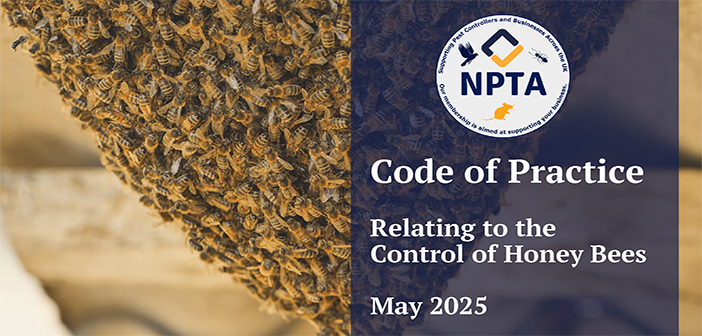NPTA has launched its Code of Practice: Honey Bees, which is now available on its website.
Mark Wenman, NPTA technical manager and board member, highlighted that honey bees are not classified as pests.
“In fact, they are among the most beneficial insects in our ecosystem, playing a vital role in pollination and biodiversity,” Mr Wenman said. “However, colonies that establish themselves in chimneys, wall cavities, or other hard-to-reach places can sometimes cause concern, distress, or even present a health and safety risk.
“In these circumstances, pest controllers are often called upon to respond. It is essential that we act with professionalism and care, ensuring that any intervention is both ethically sound and legally compliant.”
What the Code covers
The new Code of Practice outlines a structured approach to honey bee management, including:
Initial assessment and risk management
Deciding whether action is required, and making sure that risks to people, animals, and the bees themselves are considered.
Ethical extraction and relocation methods
Prioritising techniques such as cut-outs and trap-outs, followed by the safe transfer of the colony to a new location.
Specialist equipment and skills
Advising on the use of tools such as thermal imaging cameras and the need for training in areas like working at height.
Compliance and environmental responsibility
Highlighting relevant legislation and best practice in line with health and safety regulations.
When to call in expert support
Encouraging members to seek advice or assistance from experienced bee removal professionals when needed, to ensure bee welfare is protected.
Mr Wenman said: “We’ve also added a new search feature to the NPTA website. Members can now use the Bee Removal category to locate help from trusted specialists.”
More Codes to follow
He continued: “This Code is just the beginning. The NPTA is committed to raising standards across the industry by providing clear and consistent guidance to support our member.
“We are actively working on additional Codes of Practice covering other key areas of pest control. These will help ensure that technicians have access to authoritative information and professional standards that support safe, effective, and responsible service delivery.
To read or download your copy of the NPTA Code of Practice: Honey Bees, by clicking here.


